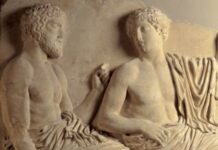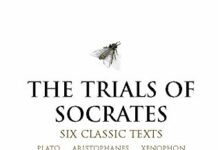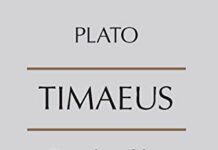
Ebook Info
- Published: 2010
- Number of pages: 254 pages
- Format: PDF
- File Size: 2.28 MB
- Authors: Plato
Description
Euthyphro/Apology/Crito/Phaedo’Nothing can harm a good man either in life or after death’The trial and condemnation of Socrates on charges of heresy and corrupting young minds is a defining moment in the history of classical Athens. In tracing these events through four dialogues, Plato also developed his own philosophy of a life guided by self-responsibility. Euthyphro finds Socrates outside the court-house, debating the nature of piety, while the Apology is his robust rebuttal of the charges against him. In the Crito, awaiting execution in prison, Socrates counters the arguments of friends urging him to escape. Finally, in the Phaedo, he is shown calmly confident in the face of death.Translated by HUGH TREDENNICK and HAROLD TARRANT with an Introduction and notes by HAROLD TARRANT
User’s Reviews
Reviews from Amazon users which were colected at the time this book was published on the website:
⭐The Last Days of Socrates is a essential reading for anyone with an interest in philosophy or Western culture. What I find so amazing about and most ancient philosophy is that the questions it raises are still relevant today. For those readers not familiar with Plato, the author of the four dialogues that make up the book, he lived during the fourth century BC. Plato is credited with founding the Academy in Athens, which was essentially the first institution devoted to philosophical research and teaching. Many scholars claim it was the prototype of all Western universities.It’s interesting to note that, Plato was a student of Socrates. And much like Jesus Christ, we have no written documents from Socrates himself. Strangely, this isn’t the only similarity between Socrates and Jesus Christ either. Whatever the reason, it seems that many people in modern society believe that the philosophy of the ancients is not relevant to them. I believe the contrary and I’m not sure we’re any wiser in the modern era. In fact, I’m quite sure that we aren’t. Yes, technology has changed, but life’s most important questions have not. And we still don’t have answers to them. If anything, there are more distractions and noise that keep us from pondering the mysteries of life today.Anyway, this book is a collection of four early Socratic dialogues: “Euthyphro,” “Apology,” “Crito,” and “Phaedo.” Translator Harold Tarrant explains in his introduction that most scholars do not believe the events depicted by Plato actually happened, but rather, they are Plato’s depiction of Socratic philosophy in action. It’s also worth noting that the Socratic dialogues were not unique to Plato.In the “Euthyphro”, Plato writes: “Consider the following point: is the holy approved by the gods because it’s holy, or is it holy because it’s approved?” This dialogue essentially examines Socrates’ questioning of religion, more specifically, holiness or piety. Holiness was one of five Greek virtues. It seems that the purpose of the dialogue is to explore the definitions of holiness by asking the difficult questions. We are left to consider whether Socratic doubt is more truthful and more valuable than unreasoned religious dogmatism. “The question which excites the Socratic mind is how anybody, man or god, can recognize any action as an instance of goodness. What is the standard, and in what terms can we express it?” On that question it must be said that “Euthyphro” fails to provide an answer that suffices.In the “Apology”, Plato writes: “It is because they enjoy hearing me examine those who think that they are wise when they are not; an experience which has its amusing side.” The classic scenario in a Greek tragedy is when a person of high moral principle is confronted step by step with a bad situation from which there is no escape, oftentimes through a conflict with people of lower moral principles. As the “Apology” demonstrates, the art of writing a tragedy was not lost on Plato.The “Apology”, then, is Socrates’ self-defense at his trial. Socrates, using his rhetorical skills, talks of the ills apparent in the Athenian government. According to Plato, Socrates did not live an ordinary and quiet life. He didn’t care for the things that most people care about: making money, a comfortable home, high status, and political appointments. He certainly was not afraid of dying. As he said, “Nothing can harm a good man either in life or after death, and his fortunes are not a matter of indifference to the gods.”Socrates supposedly said: “It is only too likely that neither of us has any knowledge to boast of; but he thinks he knows something which he does not know, whereas I am quite conscious of my ignorance. At any rate it seems that I am wiser than he is to the small extent, that I do not think that I know what I don’t know.” Accordingly, this book really ought to be read by anyone seeking a liberal education.
⭐Swan song, in the gray version of the Five Dialogues, the Hackett Classics, is a sign of damnation. In this book, it is a sign you are going to heaven. But still sad because it also means you are going to die. So there is philosophizing. Also, in this version Stygian is spelled as it is in Paradise Lost. It is not spelled correctly in the Hackett Classics version. However, it is usually a river named Styx, not Stygian that bounds the underworld.
⭐The book still had tabs in it so I was worried it would have writing in it (always a risk when ordering used, but I like to try and do my part for the environment). The tabs were the only “marking” so I’d say a win!
⭐I read this on Kindle while waiting for the arrival of another Plato book in hardback. Although my interests are elsewhere, I don’t regret having read it.
⭐I am a big philosophy fan and if you are just getting into that type of literature I recommend reading this whole book.
⭐This collection of dialogs ready makes one think about the world and how you should live in it. The Apology was the best and most moving. Euthyphro was excellent, too. Self righteousness, religious intolerance, political retributions and the unbending genius with the capacity for piercing observations shared frankly and fearlessly.
⭐why Amazon keep doing this again and again? This book is different with the reissue book. You can not just scan the other version of this book and put then says it is digital version of the original one. When search for ISBN this book pop up. Why? They have different ISBN Ok? Why this book?The reissue version have different editor and different page number. I use this book for my class. Plz do not put them together OK? It is confusing. Please notify people the scan version is different with the paper book. For some books, that is the same version. Amazon scan the paper version and put it online. But not all of them. Especially the textbook, the edition of book is important.
⭐An amazing book, although I have my reservations about the translation style. The author tried make it contemporary, and while I appreciate that there is a limit on what you can do without destroying the actual spirit of the writings of Plato. I managed to read an older translation (circa 1969) and appreciated that version much better. There seems to be a hot-bed of argument regarding the translation process of books the farther you go back in time. I don’t intend to get into a philosophical debate when rating this as it is the matter of the book and not what is inside. If you prefer to read books with a more modern slant on translation then certainly this book will suit your needs. However if you desire for a more older English that reaches a larger vocabulary palate then I suggest looking somewhere else.
⭐The Last Days of Socrates is moving, powerful and accessible. In the Euthyphro Socrates and Euthyphro discuss piety and impiety, namely what they are; Euthyphro declares that he is indicting his own father for homicide, for killing a labourer who killed a slave, because he thinks it would be impious to do otherwise. Socrates lets us know that he’s has been indicted for impiety by Meletus. Piety and impiety turn out to be what the Gods love and hate, respectively. In the Apology, Socrates gives his defence at his trial against the charges of ‘corrupting the young’ and ‘not believing in the gods in whom the city believes, but in other daimonia that are novel’ to Athens. After a moving and passionate speech, Socrates is condemned to death by the jury. The Crito is the shortest dialogue, in which Socrates rebukes Crito’s plan to help Socrates escape the prison and his fate. He does so by stating that to flee like a fugitive would be to do something unjust to the laws and the city. Finally, the Phaedo is set on the day of Socrates’ execution; Socrates and those present in the prison, mainly Cebes and Simmias, discuss at length the immortality of the soul, where the soul goes, and what happens to it after death, (namely the body and soul separate). The discussion is about ‘proving’ the immortality of the soul. Ultimately, in a brave, calm and moving manner, Socrates is administered the hemlock poison drink, and subsequently dies. The Last Days of Socrates is powerful, moving and accessible, it is essential reading for anyone, to learn about the last days of this great man, Socrates.
⭐I found this to be insightful but I do doubt the authenticity of the words. This is a fabulous read if you’re searching for information on the lives of Greeks, in particular Socrates. If however, you think this will give you an accurate representation of his actual life, I’m afraid we’ll never actual know. I’d guess it would be less dramatic than this.Despite this I still found it to be engaging and the writing is especially good. As I said in a previous review, it is more than likely a far cry from the original but you can still admire Plato’s simplicity and perfection when it comes to story telling. Like many of the classic Greek writers there is a playful hand here, a man who loved writing and telling stories to the future.
⭐I actually started reading this on holiday in the English countryside after finding it in the cottage i was staying in, hidden amongst an array of old books in a large study room.The book itself is very interesting as it doesn’t directly approach Socrates theorys as made by himself however in a third person setting describing his attitude towards what he stood for etc.Would recommend.
⭐Hello there.(I’ll be keeping it short )Last days of Socrates has 4 chapters :-ApologyCritoEuthyphroPhaedoWhereas Plato’s Republic includesThe above 4 chapters (and)MenoSymposiumGorgias (P3)So you see that it is better to buy Plato’s Republic.I bought Last days of Socrates and I wanted to keep it but the book arrived in a deformed shape with pages being bent towards one end.So I searched and purchased Plato’s Republic.There is some difference in translation as one moves from one author ( translator) to another.This is penguin classics, I also have Bantam classic.Both convey the same thing but the words used are different.I would suggest that you read one version and then read another to gain more clarity.Should you buy this book?Well, No, go for Plato’s Republic.But if you own a Library of Stoic literature then it can be added there.Thanks for reading the review.
⭐I thought I might be getting in over my head with this,considering the antiquity and seemingly academic nature of the subject.Then I thought “well your just reading it to impress people”,finally in the quest for knowledge I relented and purchased it. I was suprised from the start how my fears where unfounded and found the book very illuminating and understandable.The basic concepts of Greek philosophy are put forward and validated through dialogues in such a way as to be accessable to all.On completing this I immediately ordered the Republic and found this to be slightly more demanding in some areas but on the whole understandable. Overall the experience of reading these two books has spurred me on to read more on this subject and you should not hesitate to purchase them.
Keywords
Free Download The Last Days of Socrates: Euthyphro, Apology, Crito, Phaedo (Penguin Classics) in PDF format
The Last Days of Socrates: Euthyphro, Apology, Crito, Phaedo (Penguin Classics) PDF Free Download
Download The Last Days of Socrates: Euthyphro, Apology, Crito, Phaedo (Penguin Classics) 2010 PDF Free
The Last Days of Socrates: Euthyphro, Apology, Crito, Phaedo (Penguin Classics) 2010 PDF Free Download
Download The Last Days of Socrates: Euthyphro, Apology, Crito, Phaedo (Penguin Classics) PDF
Free Download Ebook The Last Days of Socrates: Euthyphro, Apology, Crito, Phaedo (Penguin Classics)




